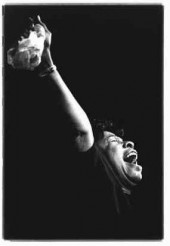Untitled Document
A long period of struggling and
near-complete obscurity preceded Betty Carter's surprising rise to fame; through
it all she never compromised her musical vision. Although she has never cared
much for avant-garde jazz, her own interpretations of standards and originals
are still so radical (with tonal distortions, a very wide range of tempoes and
many unexpected changes of direction) that there is simply no other term to
describe her unique music.
Carter studied piano and worked as a singer
in Detroit in 1946. During 1948-51 she toured with Lionel Hampton (where she
was nicknamed Betty "Bebop" Carter). After that association ended
she settled in New York, gradually developed her style and recorded with Gigi
Gryce in 1958. Although she recorded a 1961 duet album with Ray Charles that
received some attention, it would be quite awhile before she gained much recognition.
After doing some records for Roulette, Carter retired for a few years to raise
a family. In 1969 she formed a trio and in 1971 organized her own record label
Bet-Car. Gradually Betty Carter's innovative singing began to be recognized
and after she signed with Verve in the early '80s, she finally became a household
name (and a consistent pollwinner) in the jazz world. Carter's singing is not
to everyone's taste but her willingness to take chances is quite admirable and
her ability as a talent scout (her pianists have included John Hicks, Mulgrew
Miller, Benny Green, Stephen Scott and Cyrus Chestnut) is beyond criticism ~
Scott Yanow
Betty
Carter Dies Singer Extraordinaire
By Martin Weil
Washington Post Staff Writer
Betty Carter, 68, one of the great jazz singers, a link with the legends of
an earlier age and an indomitable performer who was dedicated to creating her
own improvisational style and to training the young, died of pancreatic cancer
Sept. 26 at her home in New York.
Miss Carter was a native of Flint, Mich., and she was only 16 when she sang
with Charlie Parker in a Detroit club. She performed with Dizzy Gillespie and
Miles Davis and toured with Lionel Hampton. In all, she made more than 30 albums,
but she was reluctant to rest on laurels.
"I don't have time for that," she told an interviewer a few years
ago. "I want to keep going forward." Still charming audiences well
into her sixties, Miss Carter received a National Medal of the Arts from President
Clinton at the White House last year.
"Hearing her sing 'Baby, It's Cold Outside' makes you want to curl up
in front of the fire, even in summertime," the president said, in a reference
to her classic 1960 duet with Ray Charles.
Miss Carter, whose parents named her Lillie Mae Jones, grew up in Detroit,
where her father led a church choir. From childhood, she said, "I was never
interested in anything besides music."
She studied piano at the Detroit Conservatory and was said to have falsified
her age to gain admission to the club where she sang with Parker.
Her voice won her a place with Lionel Hampton's band and some tense times.
She was drawn to the scat-singing, fast-tempo genre of bebop, for which he had
little use. As the story goes, Hampton fired her seven times in 2 1/2 years.
(Hampton's wife, entranced with her contralto, kept bringing her back.)
At the time, she called herself Lillie Carter. Hampton dubbed her Betty Bebop;
ultimately she dropped the last name and kept the first.
Despite her constant desire to improve, and possibly because of her refusal
to imitate popular styles, the 1950s and '60s were difficult.
In relative obscurity, she kept on; work with Ray Charles provided a bright
spot. "I never tried to do anything else," she said. "I was never
on welfare. I never quit."
When it finally came, recognition was prompted in part by the energy and enthusiasm
she showed at the Newport Jazz Festival in 1977 and 1978. She won a Grammy in
1988.
She came to the Kennedy Center this year with young musicians she sponsored
in the Jazz Alive program.
"I am not going to live forever," she once said. "I don't want
it to die with me. I want it to keep on."
Copyright 1998 The Washington Post Company
